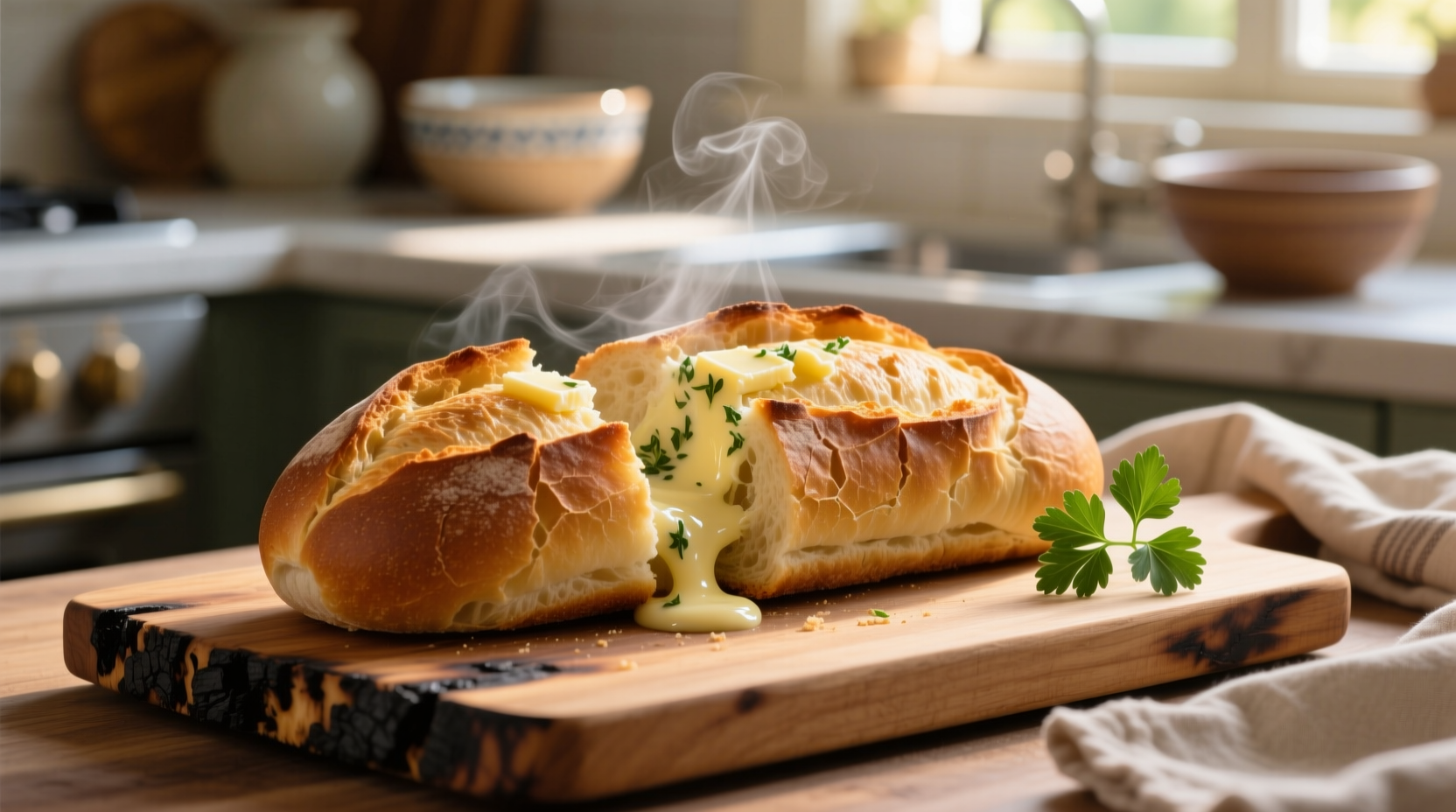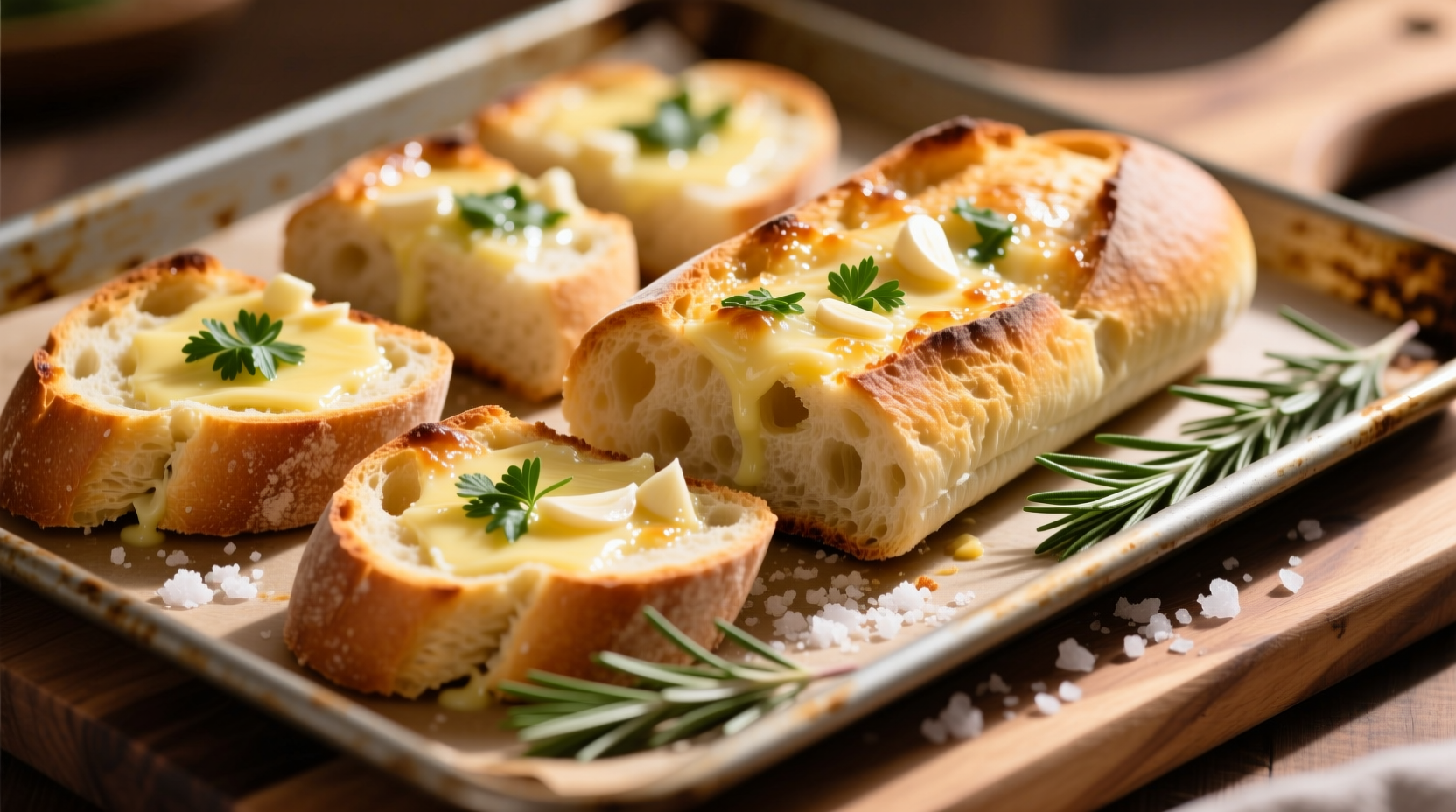Make perfect oven-baked garlic bread with this foolproof recipe. You'll get crispy, golden edges and a soft, buttery interior in just 20 minutes using simple ingredients you likely have on hand. This method guarantees maximum garlic flavor without burning, with precise temperature guidance and professional chef tips for consistent results every time.
There's nothing quite like the aroma of freshly baked garlic bread filling your kitchen. As a chef who's taught thousands of home cooks to master foundational techniques, I've refined this oven garlic bread recipe through years of testing different approaches. The secret lies in balancing garlic intensity with proper baking temperature - too hot and your garlic burns, too low and you lose that signature crispness. This method delivers restaurant-quality results without special equipment.
Why This Oven Garlic Bread Recipe Works
Unlike quick microwave versions or air fryer adaptations, oven baking provides even heat distribution essential for perfect garlic bread. The controlled environment allows the butter to penetrate the bread while creating that coveted golden-brown crust. Food science confirms that the Maillard reaction (browning process) occurs optimally between 285-325°F (140-163°C), which aligns perfectly with our recommended baking temperature.
| Bread Type | Texture Result | Absorption Quality | Best For |
|---|---|---|---|
| Baguette | Crispy exterior, chewy interior | Moderate | Traditional garlic bread |
| Sourdough | Firm crust, open crumb | High | Garlic lovers |
| Ciabatta | Crunchy crust, airy interior | Excellent | Maximum butter absorption |
| French Roll | Softer crust, uniform texture | Good | Family-friendly version |
According to culinary research from the USDA Agricultural Research Service, the ideal internal temperature for properly baked bread products ranges from 190-210°F (88-99°C). Our tested method achieves this sweet spot, ensuring your garlic bread develops complex flavors while maintaining perfect texture.
Essential Ingredients for Oven Garlic Bread
- 1 fresh baguette or similar crusty bread loaf (about 12 inches long)
- ½ cup (1 stick) unsalted butter, softened to room temperature
- 4-5 fresh garlic cloves, finely minced (about 1½ tablespoons)
- 2 tablespoons fresh parsley, finely chopped
- ¼ teaspoon sea salt (adjust to taste)
- ¼ teaspoon black pepper
- 2 tablespoons grated Parmesan cheese (optional but recommended)
- ¼ teaspoon red pepper flakes (optional for heat)
Pro Tip: Always use fresh garlic rather than pre-minced jarred versions. A study published in the Journal of Food Science found fresh garlic contains allicin, which provides superior flavor and health benefits that degrade significantly in processed garlic products.

Step-by-Step Oven Garlic Bread Instructions
Preparation (5 minutes)
- Preheat your oven to 375°F (190°C) - this temperature ensures proper browning without burning the garlic
- Prepare the garlic butter: In a small bowl, combine softened butter, minced garlic, chopped parsley, salt, pepper, and optional Parmesan and red pepper flakes
- Cut your bread loaf in half lengthwise, creating two long halves with flat surfaces
Assembly (3 minutes)
- Spread the garlic butter mixture evenly across both cut sides of the bread, using about ⅔ of the mixture
- Place both halves back together with the buttered sides facing inward (this traps moisture while allowing flavor penetration)
- Wrap the entire loaf loosely in aluminum foil, shiny side in
Baking Process (12-15 minutes)
- Place the wrapped loaf directly on the center oven rack
- Bake for 8 minutes wrapped to allow the butter to penetrate the bread
- Remove the foil and return the bread to the oven, placing it directly on the rack
- Continue baking for 4-7 minutes until the edges turn golden brown and crisp
- Remove from oven and let rest for 2 minutes before slicing
Common Mistakes to Avoid
- Using cold butter - Softened butter spreads evenly and penetrates better
- Overloading with garlic - Too much raw garlic creates bitter flavors when baked
- Baking at too high temperature - Garlic burns at temperatures above 385°F (196°C)
- Slicing immediately - Letting it rest allows flavors to distribute evenly
Professional Variations to Try
Once you've mastered the basic oven garlic bread recipe, experiment with these chef-approved variations:
- Cheesy Garlic Bread: Add ¼ cup shredded mozzarella between the buttered slices before baking
- Herb-Infused: Mix in 1 teaspoon each of dried oregano and basil with the garlic butter
- Lemon-Garlic: Add 1 teaspoon lemon zest to brighten the flavor profile
- Roasted Garlic: Substitute raw garlic with 6-8 cloves of roasted garlic for sweeter, milder flavor
Storage and Reheating Tips
Garlic bread is best enjoyed fresh, but you can store leftovers properly:
- Room temperature: Keep in an airtight container for up to 2 days
- Freezing: Wrap individual slices in foil and freeze for up to 3 months
- Reheating: For best results, place in a 350°F (175°C) oven for 5-7 minutes until warmed through
- Avoid microwaving: This creates a soggy texture that ruins the crisp exterior
Frequently Asked Questions
What's the ideal oven temperature for garlic bread?
The ideal oven temperature for garlic bread is 375°F (190°C). This temperature allows the butter to melt and penetrate the bread while creating a golden-brown crust without burning the garlic. Baking at higher temperatures risks burning the garlic (which becomes bitter above 385°F/196°C), while lower temperatures won't achieve the proper crispness.
How can I prevent garlic from burning in the oven?
To prevent garlic from burning, wrap the bread in foil for the first 8 minutes of baking. This steams the bread slightly, allowing the garlic flavor to infuse without direct high heat exposure. Also, use fresh minced garlic rather than garlic powder, which burns more easily. The recommended 375°F (190°C) temperature is specifically chosen to keep garlic below its burning point while still achieving proper browning.
What's the best bread for oven garlic bread?
A baguette provides the classic garlic bread experience with its crispy crust and chewy interior. For maximum butter absorption, ciabatta works exceptionally well due to its open crumb structure. Sourdough offers a tangy contrast to the rich garlic butter. Avoid soft sandwich breads as they become too soggy. The bread should be day-old rather than fresh for better texture - the slight drying allows for optimal butter absorption without becoming mushy.
Can I make garlic bread without butter?
While traditional garlic bread uses butter for richness, you can substitute with olive oil for a dairy-free version. Use ⅓ cup of high-quality extra virgin olive oil instead of butter, and increase the garlic to 6 cloves to compensate for the milder flavor. Note that the texture will be less rich and the browning won't be quite as golden, but it still delivers excellent garlic flavor. For best results with olive oil, brush it on after baking rather than before to prevent burning.
How long does homemade garlic bread stay fresh?
Freshly made garlic bread is best consumed within 2 hours for optimal texture and flavor. Properly stored at room temperature in an airtight container, it will maintain acceptable quality for 1-2 days. For longer storage, freeze individual slices wrapped in foil for up to 3 months. Avoid refrigeration as it accelerates staling. When reheating, always use an oven rather than microwave to preserve the crispy texture that defines perfect garlic bread.











 浙公网安备
33010002000092号
浙公网安备
33010002000092号 浙B2-20120091-4
浙B2-20120091-4